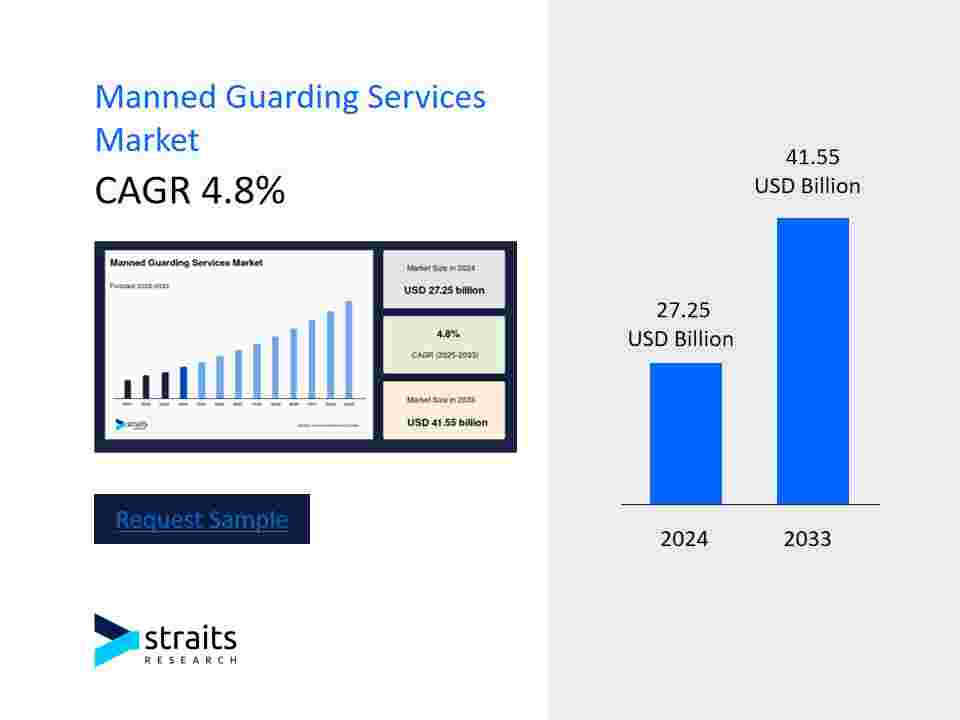In an era of advanced AI and automated security systems, the human element of protection is not becoming obsolete—it is evolving. Manned guarding services, long the bedrock of physical security, are undergoing a profound transformation. Today's security officers are increasingly becoming technology-augmented professionals, acting as the critical human interface in a layered defense strategy that blends traditional vigilance with cutting-edge digital tools. This synergy is redefining the value proposition of human-led security in a complex threat landscape.
According to Straits Research, the global manned guarding services landscape was valued at USD 27.25 billion in 2024 and is expected to grow from USD 28.56 billion in 2025 to reach USD 41.55 billion by 2033, growing at a CAGR of 4.8% during the forecast period (2025-2033). This steady growth is driven by rising security concerns across commercial and residential sectors, the persistent need for a physical deterrent that technology alone cannot provide, and the increasing integration of guards with sophisticated security ecosystems.
The industry is dominated by a mix of global giants and regional specialists. G4S plc (UK), now part of Allied Universal following a landmark acquisition, remains a behemoth with an unparalleled global reach. Their strategy focuses on offering integrated solutions where manned guards are seamlessly coordinated with electronic access control and remote monitoring centers. Securitas AB (Sweden) is another key player, investing heavily in technology-enabled guarding, equipping its officers with mobile devices connected to centralized platforms for real-time incident reporting and data-driven patrols.
In North America, Allied Universal (USA) has solidified its position as an industry titan post-merger, leveraging its scale to invest in advanced training programs and technology integration. Similarly, Prosegur (Spain) maintains a strong presence across Europe and Latin America, focusing on cash management and security services for the financial sector, where the human oversight of valuable assets remains irreplaceable.
Recent industry developments highlight a focus on specialization and technology integration. In a significant move, SIS Group (India), one of the country's largest security services providers, announced a major investment in upskilling its workforce, certifying thousands of guards in advanced screening procedures and cybersecurity awareness for high-tech client sites. This reflects a broader trend where guards are expected to be more than just observers; they are the first line of defense for both physical and digital infrastructure.
From the Middle East, particularly in the UAE and Saudi Arabia, the demand for highly trained, technology-literate security personnel has surged, driven by mega-projects and a focus on becoming global business hubs. Local firms are forming strategic partnerships with international players to import best practices in training and technology deployment. In Australia, new regulations mandating higher training standards for licenses have pushed the industry towards greater professionalism, benefiting larger, organized players who can invest in compliance.
The trends shaping the future of manned guarding are clear. The most impactful is the fusion of human personnel with technology. Guards are now equipped with body-worn cameras, smart devices running custom apps, and panic buttons that are integrated into a broader security operations center (SOC), turning them into mobile sensors. Secondly, there is a growing emphasis on specialized services, such as providing guards trained in de-escalation techniques for healthcare environments or cybersecurity basics for data center perimeters.
Furthermore, the industry is grappling with a talent transformation. The role is shifting from a passive "watchman" to an active "security officer," requiring skills in customer service, emergency response, and basic technology management. This is leading to investments in better training, higher wages, and improved career progression paths to attract a higher caliber of personnel.
Summary
Manned guarding services are evolving into a technology-augmented profession, combining human judgment with digital tools for enhanced security effectiveness. Driven by demand for integrated solutions and specialized skills, leading providers are investing in training and technology to deliver greater value. This transformation is ensuring that human security personnel remain an indispensable component of modern protection strategies.




